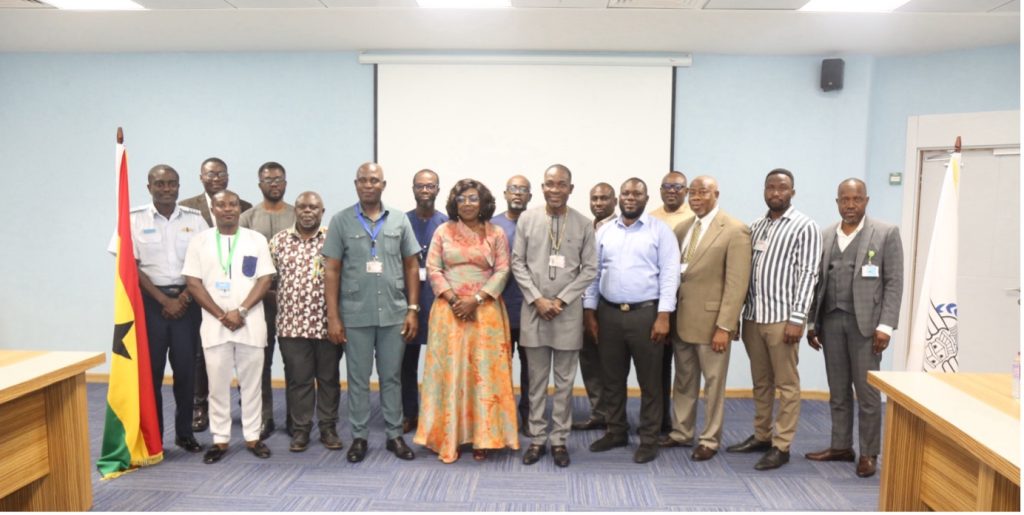National Aviation Safety Coordination Group Launched to Ensure Effective State Safety Programme Implementation

The National Aviation Safety Coordination Group (NASCG) has been inaugurated at the headquarters of the Ghana Civil Aviation Authority (GCAA) in Accra.
The inauguration took place on Thursday, 18 September 2025.
NASCG comprises representatives from the GCAA, AIB Ghana, National Communication Authority (NCA), Ghana Nuclear Regulatory Authority (GNRA), Environmental Protection Agency (EPA), Ghana Meteorological Agency (GMet), and the Ghana Air Force.
The Group provides a vital platform for collaborative decision-making, ensuring that Ghana’s State Safety Programme (SSP) is effectively implemented and continuously improved. It will serve as a forum for recommending action to address both current and emerging challenges in the aviation sector.
As part of its terms of reference, the Group is responsible for overseeing the effective and efficient implementation and maintenance of the SSP, supporting strategic decision-making and the ongoing enhancement of the state aviation safety strategy, and fostering accountability and collaboration by ensuring that each organisation meets its assigned SSP responsibilities in accordance with the Standards and Recommended Practices (SARPs) of the International Civil Aviation Organization (ICAO).
The Group is also mandated to ensure policy coherence by preventing duplication of efforts and avoiding conflicting regulations or safety initiatives, as well as facilitating coordination and communication among the different state entities involved in aviation safety operations.

Officially inaugurating the Group, Mrs. Mabel Asi Sagoe, Chief Director of the Ministry of Transport, who represented the Minister, Mr. Joseph Bukari Nikpe, conveyed the Minister’s remarks, noting that the event “marks another significant milestone in our collective efforts to strengthen aviation safety oversight and ensure that Ghana’s airspace is safer, continues to align with international best practices, and ensures a robust, secure, and sustainable aviation system.”
The Minister, through his representative, emphasised that aviation is a critical enabler of national development, connecting Ghana to the rest of the world while facilitating trade and tourism.
It is, therefore, imperative, he added, “that we continue to uphold the highest standards in safety and security, as this forms the foundation of public confidence in the aviation system.”
The inauguration of this coordination group, he continued, “demonstrates the government’s unwavering commitment to safety as the top priority in the industry.”
The Minister’s remarks also highlighted the importance of effective coordination, which is expected of all stakeholders, particularly state entities entrusted with roles in aviation safety and security.
He further stressed that the Group’s inauguration, in addition to other recent developments in the industry, demonstrates the government’s commitment to aviation safety.
“You may recall that on 4 August 2025, I joined His Excellency President John Dramani Mahama to commission the Air Navigation Service building and launch the Advance Passenger Information and Passenger Name Record System here at Kotoka International Airport. These systems are designed to enhance border security, facilitate efficient passenger screening, and support the detection and prevention of transnational crime, while at the same time improving the overall safety, security, and efficiency of air transport operations. These projects are a testament to our commitment to maintaining the high safety and security of Ghana’s airspace,” the Minister noted.
He added that the government will “continue to provide the needed support to ensure that Ghana upholds its high safety standards,” pointing out: “You’ll all agree with me that the expected economic benefits will elude the nation if we lose sight of reinforcing safety and security protocols as stipulated in ICAO Annex 17 and related Standards and Recommended Practices (SARPs).”
The Minister urged NASCG members to commit to promoting, to the greatest extent possible, a harmonised approach to facilitate safe international air travel and strengthen the confidence of the travelling public.
He also assured the Group of the Ministry’s full support to ensure that it carries out its mandate effectively and reaffirmed his commitment to providing the necessary policy guidance and enabling environment to make this coordination effective and impactful.
“It is my singular honour to officially inaugurate the National Aviation Safety Coordination Group. I urge all members to carry out their duties with dedication, foresight, and unity of purpose in service to our nation, in fulfilment of our national obligation to make the skies safer,” the Minister’s speech concluded.

For his part, the Acting Director-General of GCAA, Rev. Stephen Wilfred Arthur, described the ceremony as a “defining moment in our collective effort to strengthen the foundations of aviation safety in Ghana.”
NASCG, he noted, was first inaugurated on 15 July 2020 at GCAA. Since then, the Group has made meaningful contributions to the coordination of aviation safety efforts in Ghana, supporting the implementation of the SSP and facilitating communication among stakeholders.
He acknowledged the SSP Coordinator, Capt. Samuel Thompson and the SSP implementation team for their hard work in driving the implementation process and for their continued support in ensuring that Ghana’s SSP implementation remains effective and responsive to emerging risks in line with ICAO recommendations.
Rev. Arthur pointed out that the re-inauguration of the Group is an important step that provides it with renewed authority, enthusiasm, and the formal recognition required to carry out its mandate effectively.
He added that it also aligns Ghana with international best practices by ensuring that aviation safety coordination is not only functional but also visible and firmly anchored at the policy level.
He noted that aviation is one of the most dynamic industries in the world, yet the continued growth of air transport and the changing global landscape present safety challenges – from the integration of drones and unmanned aircraft systems to increasing operational complexities and growing demands to address cybersecurity threats to interconnected systems. These challenges necessitate a proactive approach to safety management, which cannot rest on the shoulders of one institution alone.
Instead, he said, it demands close collaboration, shared responsibility, and coordinated action from all stakeholders.
Safety management, Rev. Arthur explained, “is an overarching concept. At the industry level, service providers are required to establish and maintain their own Safety Management Systems (SMS), which provide the processes and procedures to identify and assess hazards in a timely manner and effectively mitigate safety risks. Indeed, most aviation service providers and operators in Ghana already have mature SMS frameworks in place.”
These, he stressed, must continue to evolve to address emerging challenges.
According to him, the establishment of NASCG therefore complements these efforts by creating a structured platform for coordination across state entities and industry stakeholders.
He explained that while service providers manage safety at the operational level through their SMS, the Group ensures that at the state level, all relevant actors work together under the SSP to achieve a coherent, proactive, and integrated approach to aviation safety.
Ghana, he added, has made significant progress over the years in aviation safety oversight. The country has consistently demonstrated strong performance in various ICAO audits. Its aviation sector is recognised as one of the most compliant and resilient in the sub-region. By re-inaugurating the Group, Ghana is simply reaffirming its commitment to the highest aviation safety standards.
Rev. Arthur expressed appreciation to the Transport Minister for the government’s continuous policy direction, which has provided the enabling environment for the re-inauguration. He stressed that this step aligns with the government’s policy of promoting collaboration and integration among state entities.
As the organisation responsible for coordinating the implementation and maintenance of Ghana’s SSP, GCAA remains committed to providing the technical expertise, regulatory support, and coordination necessary for the success of NASCG, he intimated.
“Together, we will consolidate Ghana’s reputation as a safe, secure, and modern aviation hub in the West African sub-region and beyond,” he said.
Rev. Arthur expressed encouragement at the participation of all state entities involved in the SSP, noting that their presence demonstrates the commitment needed to make the Group a success. He called on members to remain actively engaged and fully participate in all the Group’s activities.
“The effectiveness of this Group depends on the dedication, expertise, and collaboration of us all. Together, let us ensure that this Group becomes a strong pillar in advancing Ghana’s aviation safety and cementing our position as the leading hub in the region,” he added.
Explaining the need for NASCG, Capt. Thompson said that since the Wright Brothers’ first flight in 1903, aircraft accidents and incidents have occurred.
He noted that many reactive measures followed these incidents, leading to safety improvements such as the development of the radio altimeter and the traffic collision avoidance system, which helps prevent mid-air collisions.
He recalled that one of the most significant accidents shaping aviation safety was the Tenerife disaster, in which the collision of two jets killed 593 people after a captain mistakenly believed he had been cleared for take-off.
That incident, he explained, led to major changes in aviation telephony procedures and aviation language to ensure proper understanding between pilots and air traffic controllers. It also resulted in mandatory English proficiency tests for pilots and air traffic controllers, which must be renewed periodically.
Capt. Thompson, however, stressed that reactive measures alone have not been sufficient, underscoring the need for proactive interventions such as NASCG.
He explained that this was the rationale for ICAO’s introduction of the State Safety Programme – an integrated set of regulations and activities that a state establishes to manage safety in its entire civil aviation system. The aim is to achieve acceptable performance levels through safety policy, risk management, assurance, and promotion.
The SSP, he noted, collects data from different sources such as inspections and accident reports, analyses them to determine root causes, and uses these findings to design mitigation measures to prevent future accidents and incidents.
He added that while every organisation requires a structured decision-making approach, there is also the need for an apex body to ensure the smooth running of the SSP and to confirm major decisions on mitigation measures, especially where financial implications are involved.
The NASCG, he emphasised, will have the backing of law to ensure it continuously supports a safe aviation environment.

In a goodwill message, the Acting Commissioner of Ghana’s Aircraft Accident and Incident Investigation and Prevention Bureau (AIB-Ghana), Mr. John Wumborti, emphasised the critical role of NASCG in ensuring aviation safety.
He said the inauguration of the Group underscores the country’s commitment to improving the safety culture in Ghana’s aviation industry.
The Group, he noted, will play a pivotal role in identifying risks, reducing incidents and accidents, and strengthening the safety architecture of Ghana’s aviation sector.
You may also like
-
PROCUREMENT ADVERT – SUPPLY, INSTALLATION AND COMMISSIONING OF SPACE-BASED ADS-B SYSTEM FOR GCAA
-
GCAA PRESS RELEASE – 29-10-2025
-
DIRECTOR-GENERAL BROKERS INTERNSHIP AND SECONDMENT DEAL WITH QATAR CIVIL AVIATION AUTHORITY
-
GCAA Grants Air Tanzania Air Operator Certificate
-
Transport Minister Leads Ghana’s Delegation to 42nd ICAO Assembly
